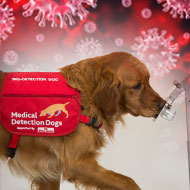
Scientists looking into whether dogs can be trained to detect the disease
Scientists are exploring whether dogs could be used to sniff-out COVID-19 and help curb the spread of the disease.
The charity Medical Detection Dogs has already trained canines to detect diseases like cancer, Parkinson’s and bacterial infections. Now it has joined forces with the London School of Hygiene and Tropical Medicine (LSHTM) and Durham University - a team which recently proved that dogs could be trained to detect malaria.
Together they have begun preparations to intensively train dogs to detect COVID-19. Scientists say that the dogs could be ready in as little as six weeks to help provide a rapid, non-invasive diagnosis towards the tail end of the epidemic.
“In principle, we’re sure that dogs could detect COVID-19. We are now looking into how we can safely catch the odour of the virus from patients and present it to the dogs, explained Dr Claire Guest, CEO and Co-Founder of Medical Detection Dogs.
“The aim is that dogs will be able to screen anyone, including those who are asymptomatic and tell us whether they need to be tested. This would be fast, effective and non-invasive and make sure the limited NHS testing resources are only used where they are really needed.”
Medical Detection Dogs has spent many years successfully researching the science behind a dog's olfactory powers. It has already produced more than a dozen peer-reviewed research papers which support its belief that each disease has a unique odour.
The dogs will be trained to detect COVID-19 by sniffing samples in the charity's training room and indicating when they have found it. Because they can also identify subtle changes in the temperature of the skin, the dogs could also be used to tell if someone has a fever.
The charity says that once trained, the dogs could be used to identify travellers entering the country infected with the virus or be deployed in other public spaces.
“Our previous work demonstrated that dogs can detect odours from humans with a malaria infection with extremely high accuracy – above the World Health Organisation standards for a diagnostic,” said Professor James Logan from The London School of Hygiene & Tropical Medicine.
“We know that other respiratory diseases like COVID-19, change our body odour so there is a very high chance that dogs will be able to detect it. This new diagnostic tool could revolutionise our response to COVID-19 in the short term, but particularly in the months to come, and could be profoundly impactful.”
Professor Steve Lindsay from Durham University added: “If the research is successful, we could use COVID-19 detection dogs at airports at the end of the epidemic to rapidly identify people carrying the virus. This would help prevent the re-emergence of the disease after we have brought the present epidemic under control.”
Image (C) Medical Detection Dogs.



 The veterinary mental health charity Vetlife is inviting the veterinary community to join it for a sponsored cold-water dip.
The veterinary mental health charity Vetlife is inviting the veterinary community to join it for a sponsored cold-water dip.